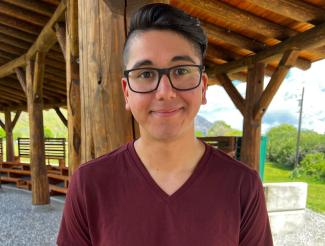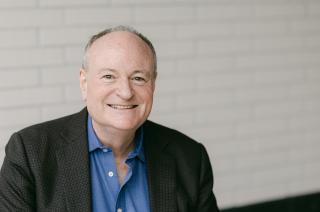
“For me, the key to law school was to remember why I was there and what I wanted to learn,” says Allard Law grad Aaron Pete.
A member of the Chawathil First Nation, Aaron plans to apply what he’s learned in law school to support the economic development of his community.
His law school journey wasn’t always a clear path, but his commitment to his community has helped guide the way. “None of my public school teachers thought I was going to be here today,” Aaron explains.
Before realizing he wanted to go to law school, Aaron completed his undergraduate degree in criminology and criminal justice at the University of the Fraser Valley. He began working with the Native Courtworkers and Counselling Association of BC, and in 2021, he was awarded a Community Safety and Crime Prevention Award for his work with the organization.
Aaron is also the host of the Bigger Than Me Podcast — where he’s interviewed more than 50 guests, including Indigenous leaders, researchers, politicians, community leaders and authors, each sharing their journeys and how they make an impact bigger than themselves.
We spoke with Aaron about his path to law school, his podcast and what’s next for him.
What inspired you to go to law school?
Growing up, I felt fairly disconnected from my Indigenous community. My grandmother had attended Indian residential school in the Fraser Valley and my mother was part of the 60s Scoop. During my degree in criminology and criminal justice, I became interested in understanding why there’s an overrepresentation of Indigenous people in the criminal justice system and got involved with the Native Courtworkers Association.
My work there focused on addressing communication barriers between First Nations communities and the criminal justice system. I worked with defense counsel and Crown Counsel and they were like, “you need to go to law school!”
What are some of the challenges you faced in getting here?
One of the challenges I've had is that nobody expected I was going to be here today. If people were placing bets, they would not have bet that I would graduate from law school.
While many of the students in law school seemed to have a long background of succeeding academically, my experience growing up in downtown Chilliwack was much different. During parent-teacher conferences, I remember my teacher saying, “it doesn't look like your son's going down the right path, we don't think that he's going to graduate, we don't think he's going to succeed.” I was sitting there thinking, "well, I’m not going to argue. This person seems more educated than me."
At the same time, I wanted to carry on and build upon the legacy of my grandmother, who went to Indian Residential School, and my mother, who struggled with a disability. They paved the path for me in their own way. They sacrificed a lot for me to be here today and I felt I had a responsibility to them.
I did have a few key people in my life that did believe in me. My partner Rebekah, my mother Linda, and my Uncle Randy were the few that believed I had untapped potential. I trusted their judgement, studied for the LSAT at Starbucks daily, and sent in my application.
What did you take away from your time in law school?
My approach to law school was ‘I'm here to learn.’ I wasn’t worried about getting into the highest tier law firm in all of Canada — my goal was to bring what I learned back to my community.
When Professor Camden Hutchison was a guest on my podcast, he explained that your law degree is an incredible tool, beyond just practicing as a lawyer. He opened my eyes to the idea of making a difference in my community as an entrepreneur and using the law as a tool. He highlighted what law students often don’t think of — we gain an understanding of the world and the underlying systems that allow society to function. That opens all the doors. It was encouraging and something I needed to hear because I did feel like an outsider — perhaps not seeing exactly where I fit into practicing the law in the traditional sense.
And then the Taxation of Corporations and Shareholders course was the hardest class I've taken in my life, but one of the most valuable in terms of understanding how a certain portion of the population looks at the world. Professor Duff was amazing. The course shows how very successful people and corporations look at the world. I was sitting in that classroom, looking around the room thinking, how often are Indigenous people in this classroom? How often is this reaching marginalized communities? And how can we implement what he's talking about? It was so humbling and so motivating to be in that room.
Your Bigger Than Me podcast now has more than 50 episodes. Tell us about one of your favourite recent guests.
It is hard to choose because each guest has shared something unique. I’ve sat down with ocean pollution experts, business owners, expert beekeepers, Indigenous leaders, politicians and creators — all with an inspiring journey.
One of my favourite guests was Carrielynn Victor, a muralist here in BC who helped revitalize the Fraser River. She looked at the practice of putting rocks along the Fraser River to try to repair the ecosystem and found that those rocks are deteriorating over time and it's becoming harder and harder for the fish to breathe. She brought native species back to the area, got rid of the rocks and rebuilt the ecosystem.
Carrielynn also helped name places throughout the Fraser Valley, like Sxótsaqel Park, which means sacred lake. She argues that the reason we need place names is so that we understand why we should protect these places.
For example, first you have a little trail, and then we start to put rocks on the trail so it's smoother, then we paved the trail, then we put in parking and then we fully developed it and now it’s an apartment building. That land is no longer what it was, so an Indigenous place name gives you that reminder. I like that because I've struggled personally with land acknowledgements. Sometimes I hear them and think, "you don't know what you're saying!" To me that’s not reconciliation.
So Carrielynn provided a different path forward, which is to go learn about the ecosystems in your area. Don't just give lip service. Go learn about the lakes and mountains around you. What is the wildlife you'd expect to find in your area? Go take an interest in that. If you're not going to take an interest in what our land is, understand why the land matters.
You’ve just graduated from law school. What’s next?
I'm hoping to work on the Economic Development Committee for my own community, taking what I've learned and continuing to apply it. One law course that will be particularly useful was First Nations Economic Development. I wrote a paper on economic development corporations and learned how important it is to first do community consultations and develop a Community Plan before developing a corporation.
Another project I’m working on is a clothing line that features facts about Indigenous culture. The goal is to share facts that interest people and that provide an introduction to Indigenous culture and the beauty of it, rather than just focusing on the atrocities that have taken place.
For example, what does ‘seven generations’ actually mean to Indigenous people? What I hope to share through the clothing will be things that can contribute to a better understanding of the world.
What advice do you have for new law students?
I gave this advice to a friend who was just starting law school: the most important thing is to understand what you hope to gain from the experience. Understand which tools you're trying to develop. In class, ask questions because they're relevant to you, rather than hearing someone else ask a really intelligent question and going, “how do I ask a more sophisticated question?” Ask the questions that feel relevant to you.
You don't have to have a firm plan about your future career, but understand how law school builds upon your understanding of the world. I recommend you hold your values close to you when you see other people and their successes. Remember why you went there in the first place and hold true.

